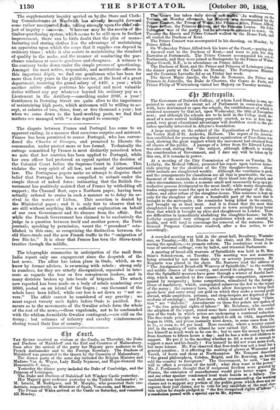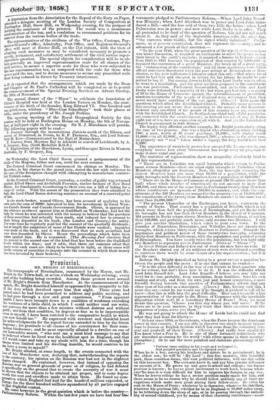311rtrufulio.
The Governors of Dulwich College, of whom Lord Stanley is one, em, pointed to carry out the recent act of Parliament in connexion the with, have determined to open the schools, the establishment of which is rendered necessary by that act, upon Wednesday, the 10th of November next; and although the schools are to be held in the College itse4 in- stead of a more central building purposely erected, as was at first swp. posed, very great educational advantages will doubtless result to the pe- rishes specially interested in Alleyne's foundation.
A large meeting on the subject of the Equalization of Poor-Rates at the Vestry Hall of St. Andrews, Holborn. The report of the Ass ' tion established for procuring the desired equalization of Poor-Rates was read, showing the great support which the movement had obtained from all eln8ses of the public. A passage of a letter from Sir Edward Lytton was also read, stating that "the subject, although difficult, is worthy the consideration of Government, and I dare say will be taken up by this one, if it remains in power.
At a meeting of the City Commission of Sewers on Tuesday, Dr. Letheby, the Medical Officer, presented his report upon various memo- rials praying for the abolition of the City slaughter-houses. About 6500 animals are slaughtered weekly. Although the ventilation is good, and the arrangements for cleanliness are all that is practicable, the con- finement of the animals, the soaking of their blood into the ground, and other circumstances, create a noisome smell and necessarily keep ups pu. trefactive process detrimental to the meat itself; while many disagreeable trades congregate round the spot in order to take advantage of the skin, tallow, and other refuse of the slaughter-house. This nuisance is kept up only for the slaughter of about a hundredth part of the meat that is brought to the metropolis ; the remainder being killed in the country, and brought up as dead meat. And it is found that the meat thus slaughtered in the country and conveyed to town actually keeps better than that which is brought up alive and slaughtered in London. There are difficulties in immediately abolishing the slaughter-houses; but Dr. Letheby suggested very stringent regulations which are essential to health, and will tend to encourage the removal of the nuisane.e. The General Purposes Committee resolved, after a due notice, to act accordingly.
A crowded meeting was held in the great hall, Broadway, Westmin- ster, on Tuesday,—Mr. IL Brooks in the chair, and Mr. Ernest Jones among the speakers,—to promote reform. The resolutions went in fa- vour of universal suffrage, vote by ballot, and triennial Parliaments.
A meeting of broad-silk weavers of Spitalfields was held in St. Mat- thias's School-room, on Tuesday. The meeting was not numerous, being attended by not more than sixty or seventy journeymen. Mr Noguette was placed in the chair. Mr. Burrows read the address of "The Amalgamated Broad-silk Weavers of Spitalfields," to the working and middle classes of the country, and moved its adoption. It reports that the Spitalfield weavers have gone through a winter of fearful hard- ship, which is ascribed to five causes—Foreign competition, unaccom- panied by reciprocity ; home competition, stimulated by the foreign; abuse of machinery, which, unregulated subserves the few to the injury of the many ; the currency laws, which allow foreigners to bring their goods here and carry away our gold on which they make a second profit abroad, while employers, artisans, and shop-keepers are deprived of the medium of exchange; and Poor-laws, which instead of being " Chris- tian " are "diabolic." Amendments on these five points are apoken of as "the five principal rights of labour." Mr. Delaforce, who seconded the adoption of the report, stated some facts connected with the condi- tion of the trade in which prices are undergoing a continual reduction. The free-trade principle was first applied to silk in 1824, importation began in 1826, and prices instantly went down, in some cases from 158. to 78., or even 48. 6d. per head. More recently, where a weaver earned 10d. in the making of satin riband he now earned 3-td. Mr. Delaforce has himself as much work as he can do ; but to earn his money he works from fourteen to fifteen hours a day ; and he has a wife and children to support. He put it to the meeting whether 48. 6d. a week is enough to support a man and his family ? For himself he did not want more work, but more leisure. Mr. Fox observed that free-trade was not a local but a general question ; it is affecting the making of gloves at Worcester and Yeovil, of boots and shoes at Northampton. Mr. Tempest described "the grand philosophers, Cobden. Bright, and Dr. Bowring, as havmg sold the country to foreigners." The Government, he said, "has the will to effect a revision of the tariff; what they want is the power.' Mr. T. Ferdinand° thought that if reciprocal freedom were grantedly France, the extension of manufactures would give better wages. and one other speaker condemned local trade boards as a fallacy. The resolution was carried ; as well as another recommending the working classes not to support any portion of the public press which does not re: cognize their just claims, nor to vote for any candidate at the next Cl tion unless he stands pledged to "the five recognized rights of labour " a Yeeektticai passed with a epeoial eye to Mr. Ayrton. A deputation from the Association for the Repeal of the Duty on Paper, flded a delegate meeting of the London Society of Compositors at Feeengeon Hall, Snow Hill, on Wedpesday evening, for the purpose of ieveteag the assistance of the printers. The result was a unanimous condemnation of the tax, and a resolution to recommend petitions for its rerneval from the various bodies of the trade. The representatives of the civilians of the War Office Customs, Pay- oster-Genend's office, Admiralty, Post Office, and Registrar-General's office, will meet at Exeter Hall, on the 31st instant, with the view of adopting such measures as may he considered necessary to promote a speedy, permanent, and satisfactory settlement of the civil service super- annuation question. The special objects for consideration will be to ob- tain generally an improved superannuation scale for all classes of the civil service, to secure a superior scale for those who were subjected to the late superannuation tax, as compared with the scale for those who never paid the tax, and to devise measures to secure any prescribed scale from being reduced in future by Treasury interference.
ee It is expected that the arrangements which are made by the Dean and Chapter of St. Petul's Cathedral will be completed so as to permit the commencement of the Special Evening Services on Advent Sunday, the 28th of November. The annual dinner of the " Blues " to celebrate the foundation of meet's Hospital was held at the London Tavern on Monday, the anni- versary of the birth of the founder, King Edward VI. One hundred and one gentlemen, whilom "Blue-Coat Schoolboys" took their places at table, under the presidency of Mr. Joseph Perkins.
The opening meeting of the Royal Geographical Society for this session will be held at Burlington House on Monday, the 8th of Novem- ber, at half-past eight in the evening. Sir R. J. Murchison will preside. The following papers will be read- 1. Journey through the mountainous districts north of the Elburz, and ascent of Demareud, in Persia, by It. F. Thomson, Esq., and Lord Scheme berg H. Kerr—Communicated by the Earl of Malmesbury. 2. Journey from Moreton Bay to Adelaide in search of Leielihardt, by A. C. Gregory, 'Esq. (Gold Medallist R.G.S.)
S. Exploration of the Murchison, Lyons, and Gascogue Rivers in Western Australia, by F. Gregory, Esq.
On Wednesday the Lord Chief Baron granted a postponement of the trials of the Hugons, father and son, until the next sessions.
The Central Criminal Court commenced its sittings on Monday. The Recorder, in his charge to the grand jury, stated the law with reference to the ease of the foreigners charged with attempting to manufacture counter- feit Turkish coins.
At the Central Criminal Court, yesterday, a verdict of guilty was returned against Alfred Skeen and Archibald Freeman, timber-brokers of New Bond Street, for fraudulently transferring to their own use a bill of lading for a cargo of cedar. With the assent of the prosecution they were admitted to bail, the Lord Chief Baron deferring sentence on account of a reserved point of law.
A city stock-broker, named Oliver has been accused of applying to his i own uses the sum of 5000/. intrusted to him for investment n Great West- ern Canada Bonds and Canada Government Bonds. Oliver, it appeared by the evidence produced against him at Guildhall on Wednesday, had led the lady by whom he was intrusted with the money to believe that the purchase of these securities had actually been made, and induced her to consent to their being deposited in his bank, (the London and County,) for safety. For some time he regularly paid her the amount of the quarterly dividends ; but at length the suspicions of some of her friends were excited ; inquiries were made at the bank, and it was discovered that no such securities had ever deen deposited by Oliver. Hence the proceedings which have been taken against him. fie is remanded. [The Morning Post observes that the present is the second ease of the kind that has been before the Guildhall Court within ten days; and it adds, that there are rumours afloat that many more such eases are likely to be brought to light, as these eases will incite owners of securities to inquire into the manner in which their money has been invested by their brokers.]



























 Previous page
Previous page